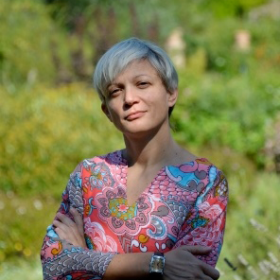
Zrinka Stahuljak
Professor of Comparative Literature and French; Director, CMRS Center for Early Global Studies; Co-Director, UCLA Experimental Critical Theory Program
Growing up in a minor language (Croatian) in a communist regime of the former Yugoslavia, where nationalist (post-imperial, post-Ottoman and post-Habsburg) and universalist (communist internationalism) narratives were in conflict with each other, Zrinka Stahuljak was led to the study of the Middle Ages, a formative period both for European early modern and modern discourses and for the vernacular, later national, languages. She obtained her P.hD.from Emory University and, today, teaches medieval studies at UCLA in the departments of French & Francophone Studies and Comparative Literature. Previously, she taught at Boston University.
Professor Stahuljak’s life-long intellectual project was definitively shaped by her experience as a wartime interpreter on the frontlines of the wars in the former Yugoslavia. As a theorist of translation, she has written about interpreting in conflicts (e.g. Critical Readings in Translation Studies, Routledge, 2010). As a medievalist, Professor Stahuljak has worked on issues of translation, representation, cultural production, and the relationship of historiography to history. Her interests lie in exchange, mediation, and transmission; She has explored and analyzed linguistic predicaments, cultural differences, and power structures. Her current book-in-progress, “Medieval Fixers: Translation in the Mediterranean (1250-1500)” (forthcoming, U of Chicago P), brings together these two parallel strands and strengths central to her scholarly work.
Professor Stahuljak’s research has been supported by the Guggenheim Foundation, Fulbright Research Scholarship, and Institute for Advanced Study in Princeton. In 2020, she was elected to the Croatian Academy of Arts and Sciences.
Education
- Ph.D., Emory University, 2000
Featured Works
-
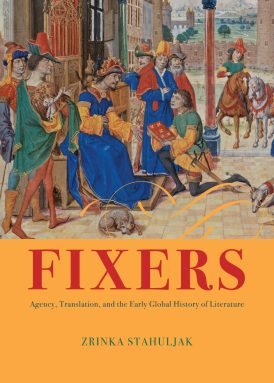
- Fixers
- University of Chicago Press, 2023
-
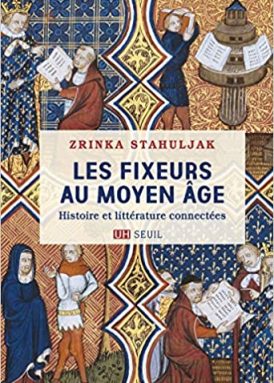
-

-
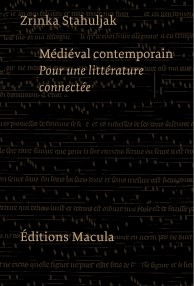
-
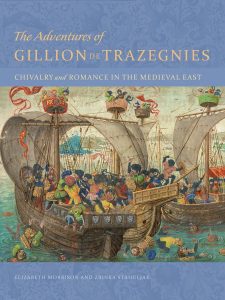
-
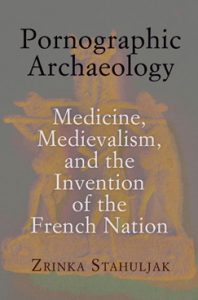
-
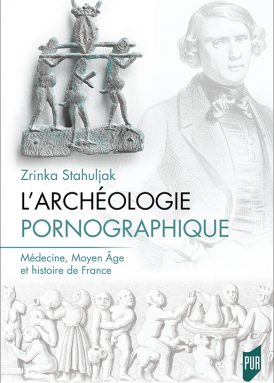
- L’archéologie pornographique: Médecine, Moyen âge et histoire de France
- Presses Universitaires de Rennes, 2018
-
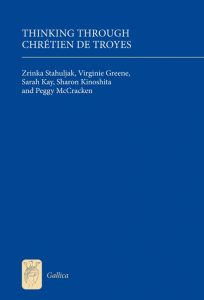
-
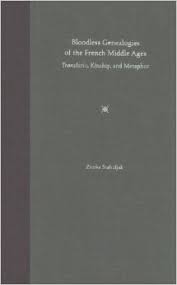
Selected Publications
Articles
- “Afterword. Fixing Translation: Fixers as Paradigm for a Commensurate Social History of Translation,” Special Issue, Journal of Early Modern Cultural Studies 21:4 (2021), ed. Claire Gilbert [2023].
- “Translation,” in Transnational Modern Languages: A Handbook, 313-321, eds. Jennifer Burns and Derek Duncan, Liverpool University Press, 2022.
- Response essay to H-France Forum on “Z. Stahuljak, Médiéval contemporain: Pour une littérature connectée (Macula 2020),” vol. 16.4, September 2021, https://h-france.net/h-france-forum-volume-16-2021/
- “Transgender Translation, Humanism, and Periodization: Vasco da Lucena’s Manuscripts of The Deeds of Alexander the Great,” 207-231, in Trans Historical: Gender Plurality Before the Modern, eds. Greta LaFleur, Masha Raskolnikov, and Anna M. Klosowska, Cornell University Press, 2021.
- “Les langues du voyage: le roman bourguignon et ses fixeurs méditerranéens,” 233-241, in Écrire le voyage au temps des ducs de Bourgogne. Actes du colloque international organisé les 19 et 20 octobre 2017 à l’Université du Littoral – Côte d’Opale (Dunkerque), eds. Jean Devaux, Matthieu Marchal et Alexandra Velissariou, Brepols, coll. Burgundica, 2021.
- “Médiévalisme,” 803-809, in Nouvelle histoire du Moyen Âge, ed. Florian Mazel, Éditions du Seuil, 2021.
- “D’Alexandre et de quelques Amazones: portraits textuels et visuels,” 85-99, in La femme sauvage dans les arts et les lettres, eds. Christine Ferlampin Acher and Bruno Boerner, Presses universitaires de Rennes, 2021.
- “Connected Literature: Chansons de geste, Burgundian livres de gestes, and the Writing of Literary Theory,” 99-111, in The Futures of Medieval French, eds. Jane Gilbert and Miranda Griffin, D. S. Brewer, 2021.
- “World Collecting: Patronage, Spoliation, and Forms of Government,” 1181-1189, in The Wiley-Blackwell Companion to World Literature, Vol. 2: 600 C.E. to 1450 C. E., ed. Christine Chism, general ed. Kenneth Segneurie, Oxford: Wiley-Blackwell, 2019.
- “L’empire des livres: imagination, matière d’Orient, et archive du possible aux Pays-Bas bourguignons,” in Tirant. Butlletí informatiu i bibliográfic de literatura de cavalleries 22: 195-206 (2019), special issue Don Quichotte avant Don Quichotte.
- “The Long Middle Ages of Jacques de Lalaing: Medieval Genres and the Status of History,” 77-89, in A Knight for the Ages: Jacques de Lalaing and the Art of Chivalry, ed. Elizabeth Morrison, J. Paul Getty Publications, 2018.
- “The Pilgrim Translation Market and the Meaning of Courtoisie,” 201-220, in The French of Outremer: Communities and Communications in the Crusading Mediterranean, eds. Laura Morreale and Nicholas Paul, Fordham University Press, 2018.
- “La Vie de Saint Alexis and the Alexis Quire in the Crusading Context,” 195-218, in St. Albans and the Markyate Psalter: Seeing and Reading in Twelfth-Century England, eds. Kristen Collins and Matthew Fisher, Medieval Institute Publications, 2017.
- “Merlin à Jérusalem: Un traité de croisade pour les rois d’Angleterre,” 491-500, in Arthur après Arthur. La matière arthurienne tardive en dehors du roman arthurien, de l’intertextualité au phénomène de mode, ed. Christine Ferlampin Acher, Presses universitaires de Rennes, 2017.
- “Translation and Multilingualism in the Medieval Mediterranean,” Exemplaria: Medieval, Early Modern, Theory26(4): 389-400 (Winter 2014).
- “Genealogy,” 71-78, in Medievalism: Critical Terms, eds. Elizabeth Emery and Richard Utz, D.S. Brewer, 2014.
- “History as a Medical Category: Heredity, Positivism, and the Study of the Past in Nineteenth-Century France, ”History of the Present 3 (2): 140-159 (Fall 2013).
- “The Sexuality of History: The Demise of Hugh Despenser, Roger Mortimer, and Richard II in Jean Le Bel, Froissart, and Jean d’Outremeuse,”133-147, in Violence and The Writing of History in the Medieval Francophone World, eds. Noah D. Guynn and Zrinka Stahuljak, D.S. Brewer, 2013.
- “Historicity, Violence, and the Medieval Francophone World: Mémoire hystérisée,”1-16, with Noah Guynn, in Violence and The Writing of History in the Medieval Francophone World, eds. Noah D. Guynn and Zrinka Stahuljak, D.S. Brewer, 2013.
- “Medieval Fixers: Politics of Interpreting in Western Historiography,” 147-163, in Rethinking Medieval Translation: Ethics, Politics, Theory, eds. Bob Mills and Emma Campbell, D.S. Brewer, 2012.
- “History’s Fixers: Informants, Mediators, and Writers in the Prise d’Alixandre,” 277-292, in A Companion to Guillaume de Machaut. An Interdisciplinary Approach to the Master, eds. Deborah McGrady and Jennifer Bain, Brill, 2012.
- “Sexuality, Shame, and the Genesis of Romance,” 57-66, in Cambridge History of French Literature, eds. William Burgwinkle, Nicholas Hammond, Emma Wilson, Cambridge University Press, 2011.
- “Minor Empires: Translation, Conflict, and Postcolonial Critique,”The Translator 16(2): 255-274 (November 2010), special issue on Translation and Violent Conflict.
- “‘Archéologie pathologique’: Le Moyen Age et l’histoire de la médecine,” 207-14, in Fantasmagories du Moyen Age, Senefiance 56, eds. Élodie Burle-Errecade and Valérie Naudet, Aix-en-Provence: Publications de l’université de Provence, CUERMA, 2010.
- “War, Translation, Transnationalism. Interpreters In and Of the War (Croatia, 1991-1992),” 391-414, in Critical Readings in Translation Studies, ed. Mona Baker, Routledge, 2010.
- “Traduire la honte (Le Tribunal pénal international pour l’ex-Yougoslavie et son deuxième monde),” 165-183, in Lire, écrire la honte, ed. Bruno Chaouat, Presses universitaires de Lyon, 2007.
- “Neutrality Affects: Froissart and the Practice of Historiographic Authorship,” 137-156, in The Medieval Author in Medieval French Literature, ed. Virginie Greene, Palgrave/McMillan, 2006.
- “Chrétien de Troyes, moralisateur impossible,” La Revue littéraire 19: 115-131 (October 2005).
- “Crimes sexuels. Les femmes et latranslatiodans les ‘romans antiques’ écrits en ancien français,” 15-29, in D’une écriture à l’autre. Les femmes et la traduction sous l’Ancien Régime, ed. Jean-Philippe Beaulieu, Ottawa: University of Ottawa Press, 2004.
- “An Epistemology of Tension: Translation and Multiculturalism,” The Translator 10 (1): 33-57 (April 2004).
- “Jean Froissart’s Chroniques:Translatio and the Impossible Apprenticeship of Neutrality,” 121-142, in Politics of Translation in the Middle Ages and the Renaissance, eds. Renate Blumenfeld-Kosinski, Luise von Flotow, Daniel Russell, Ottawa: University of Ottawa Press, 2001.
- “Violent Distortions: Bearing Witness to the Task of Wartime Translators, ”Traduction Terminologie Rédaction 13 (1): 37-51 (Spring 2001), special issue Ideologies and Translation.
- “Future’s Phantoms, or Reincarnations of the Parricidal Past in the Roman d’Eneas,”L’Esprit Créateur 40 (1): 14-24 (Spring 2000), special issue Writing One’s Death: Between Fiction and Testimony.
- “The Violence of Neutrality: Translators in and of the War (Croatia, 1991-92),” College Literature 26 (1): 34-51 (Winter 1999), special issue Cultural Violence.
- Introduction and Translation of selections from the Old French Virgilian tradition (Roman de Cléomadés; Image du monde; Noirons li arabis; Renart le contrefait). The Virgilian Tradition to 1500. Eds. Michael Putnam and Jan Ziolkowski, Yale UP, 2008.
Edited Volumes
- Violence and The Writing of History in the Medieval Francophone World, co-edited with Noah Guynn. D.S. Brewer (Gallica), 2013.
- Minima Memoria: Essays in the Wake of Jean-François Lyotard, co-edited with Claire Nouvet and Kent Still. Stanford University Press, 2007.
Courses commonly taught
- Comparative Thinking (CL 250A)
- Narrative Thinking (CL 250A)
- Ternary Positionality: Relationally, Decoloniality, and Interpretation (CL 250)
- Medieval Studies: Travel and Translation (CL 220)
- Old French (FRNCH 214)
- Francophone Literature of the Medieval Mediterranean (FRNCH 215)
- Mediterranean Studies (FRNCH 215)
- Survey of Literature: Middle Ages to 17th century (CL 2BW)
- Medieval Foundations of European Civilization (FRNCH 112)
- Survey of French Literature (Middle Ages & Renaissance) (FRNCH 114A)
Honors and Awards
- PI, Mellon Foundation Grant, “Race in the Global Past through Native Lenses” (2023-2026), $1M
- Co-PI, GLOHUM (Global Humanisms: New Perspectives on the Middle Ages, 300-1600), Croatian Science Foundation-European Union Grant (PZS-2019-02-1624), Nov. 1, 2019-Feb. 28, 2023 (ca. 300,000 Euros). Awarded in 2023 the recognition of the highest ranked project in the Programme for Scientific Cooperation from the Croatian Science Foundation (HRZZ).
- Honorary Visiting Professor, EHESS, Paris (March 20-April 15, 2023), https://www.ehess.fr/fr/personne/zrinka-stahuljak
- Honorary Visiting Professor, NSTC (National Science and Technology Council) Funding Source, Taiwan, November 2022.
- Honorary Visiting Professor, University of Iceland, Reykjavik, May 2022, New Critical Approaches, https://english.hi.is/faculty_of_icelandic_and_comparative_cultural_studies/course_work
- Corresponding Member, Croatian Academy of Arts and Sciences, 2020-to date.
- International Fellow, Institute of Advanced Study, University of Warwick, February 2019.
- Visiting Professor (Professeure invitée), Collège de France, June 2018.
- Fellow, John Simon Guggenheim Memorial Foundation, 2016.
- Visiting Chair, Chaire des Ameriques, Institut des Ameriques de Rennes, Universite Rennes 2, September – October 2016.
- J. William Fulbright Foreign Scholarship Board, Fulbright Research Scholar, 2012-2013.
- Exploratory Seminar Grant, Radcliffe Institute for Advanced Study, May 2007.
- Member, Institute for Advanced Study, School of Social Sciences, 2005-2006.
- Junior Fellow, The Society of Fellows, Humanities Foundation, Boston University, Fall 2003.
- Teaching Excellence Award, Honors Program, Boston University, 2002-2003.
Professional Activities
- Director, CMRS Center for Early Global Studies, July 2019-to date
- Co-director, UCLA Experimental Critical Theory Program, https://ect.humspace.ucla.edu/
- Series Editor, Anamnèses: Médiéval/Contemporain, Éditions Macula (Paris), https://www.editionsmacula.com/collections/
- ARTE TV channel, “Le Graal, la quête d’une fiction,” Faire l’histoire, April 9, 2022, https://vimeo.com/637097808/84472fa8f1
- Festival Manufacture d’idées, “Ressources humaines: fixeurs,” Hurigny, August 27, 2002, https://www.youtube.com/watch?v=7tOlQI33Wa4&t=36s
- “Un Moyen Âge inventé,” France Culture, June 22, 2018, https://www.franceculture.fr/emissions/la-fabrique-de-lhistoire/lactualite-en-histoire-11
- “Une ‘archéologie pornographique’ pour penser la nation française,” MediaPart, June 12, 2018, https://www.youtube.com/watch?v=UKDm-kRkwJc

